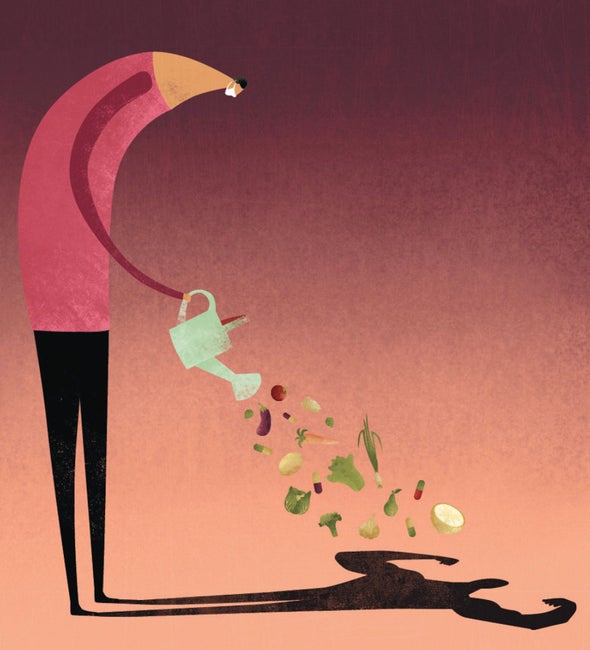Fear and fraud often travel together. As coronavirus anxiety began to spread across the land, so did bogus nostrums promising protection from this modern-day plague. As early as March 6, 2020, U.S. regulators began to issue warnings to companies promoting false claims, such as this one touting the benefits of drinking a daily dose of silver particles: “It’s actually widely acknowledged in both science and the medical industry that ionic silver kills coronaviruses.” Um, no.
For people who hope to build up their resistance to coronavirus and infections of all kinds, there are no magic formulas—but there are some science-based steps one can take to maintain a healthy immune system. For starters, don’t smoke. Cigarette smokers are much more vulnerable to respiratory infections. Second, make sure you are covering all your nutritional bases with a wide variety of vegetables, fruits and other elements of a healthy diet. “Eating an optimal diet reduces the risk of getting an infection and reduces the severity of infections,” says Wafaie Fawzi, professor of nutrition, epidemiology and global health at Harvard University’s T. H. Chan School of Public Health. Third, practice good sleep hygiene so you can raise your chances of adequate nightly rest. And fourth, get regular exercise, which will also help you sleep.
On the dietary front, several nutrients have been tied to improved resistance to viruses. Taking zinc supplements, for example, has been linked to a reduced rate of respiratory infections and shorter duration of related symptoms. Deficiency in zinc, a mineral found in meat, shellfish, nuts and whole grains, is more prevalent in less developed countries, Fawzi notes, but it can occur in wealthier nations, especially during a time of high unemployment and disruptions to the food supply chain.
Vitamins C and D have also been shown to improve resistance to respiratory infections. Perhaps relevant to COVID-19, vitamin C plays a role in reducing tissue damage from our own immune responses. Oral doses of the vitamin have also been shown to shorten the amount of time in an ICU and on a ventilator for heart surgery patients, according to a 2019 meta-analysis. Could it help COVID patients? Researchers are looking at it, Fawzi says.
As for vitamin D, a 2017 meta-analysis of 25 randomized controlled trials found that vitamin D supplements cut the risk of acute respiratory infection—especially for people with low levels of the vitamin, which is about 40 percent of Americans. The percentage is far higher in Black Americans and Hispanics. Fawzi points out that late winter/early spring, when the pandemic began in the U.S., happens to be when D levels are especially low because we acquire the nutrient mainly via sun exposure.
Fawzi and his colleagues are investigating whether vitamin D might help COVID patients. In the meantime, he suggests taking a basic multivitamin. “A supplement with the recommended daily allowances of vitamins and minerals would be prudent,” he says, along with a balanced diet. It might particularly help elderly adults, who are prone to nutritional deficiencies.
As for sleep, scientists have long known that it plays an essential role in bolstering our defenses. Studies show that if you deprive people of sleep after administering a vaccine, they will produce a weaker antibody response than folks who slept. Research suggests that sleep enhances the migration of T cells to the lymph nodes, where they are presented with foreign molecules that trigger antibody production, explains neuroscientist Luciana Besedovsky, who investigates sleep and the immune system at Ludwig Maximilian University of Munich in Germany.
A 2015 study that measured average sleep duration for 164 healthy volunteers and then dripped a rhinovirus into their nose found that those who slept six or fewer hours a night were four times as likely to develop a cold as those who slept more than seven hours. Similarly, a study that followed 57,000 women found that those who slept five or fewer hours nightly were 40 percent more likely to have developed pneumonia over a four-year study period than eight-hour sleepers. Prolonged sleep loss, Besedovsky says, can create a state of low-grade inflammation: “This seems to exhaust your immune system in the long run, so that it may not be able to fight infections that well.”
Committing to a regular bedtime and nightly routine that helps you sleep, along with a healthy diet—and perhaps a multivitamin—will not necessarily keep the coronavirus at bay. But these steps have a true silver lining of helping you endure whatever health threats blow your way.


